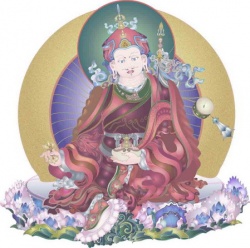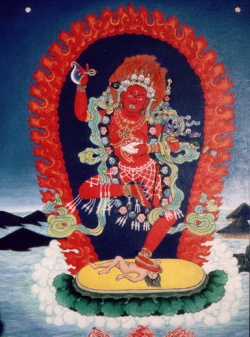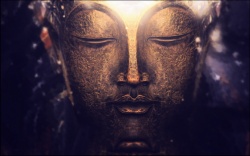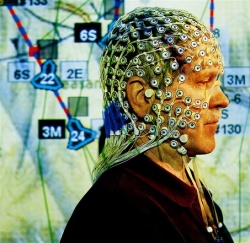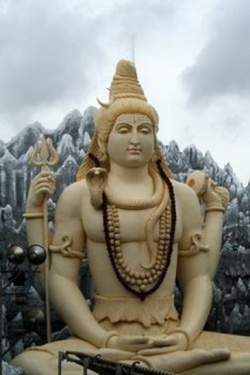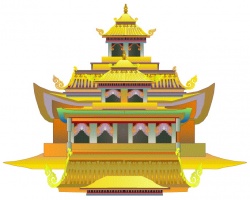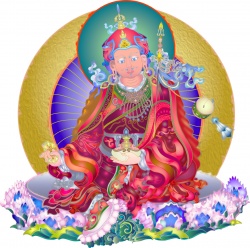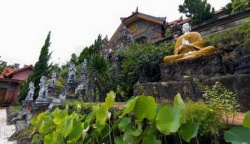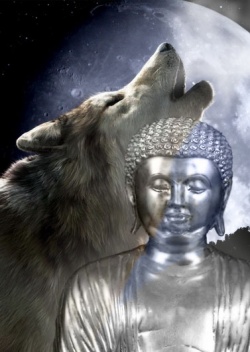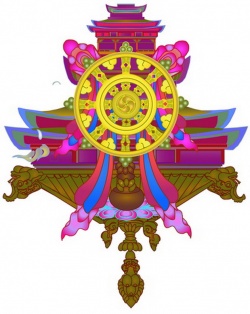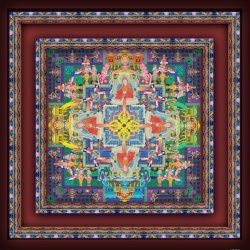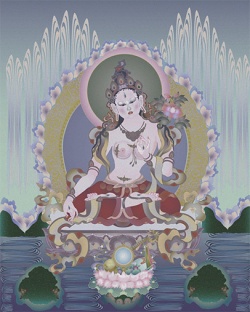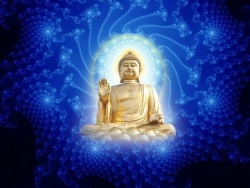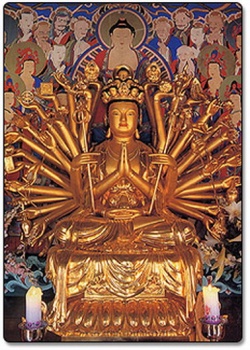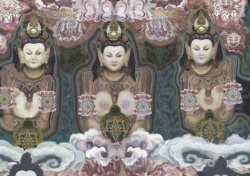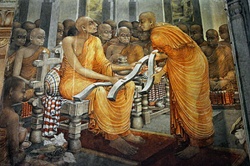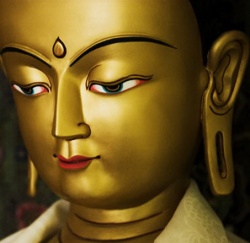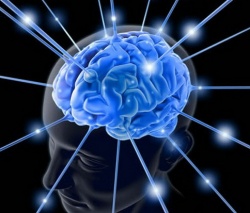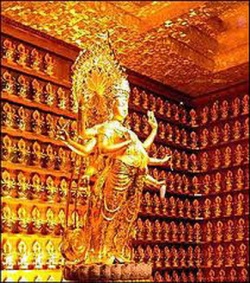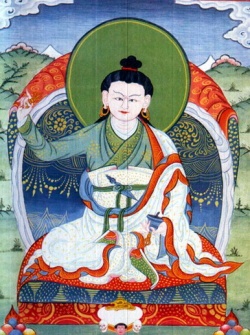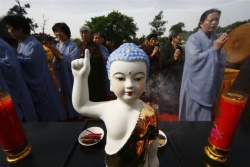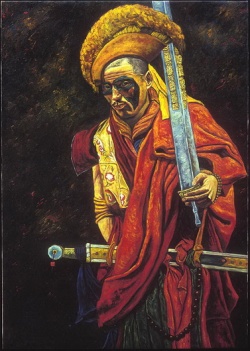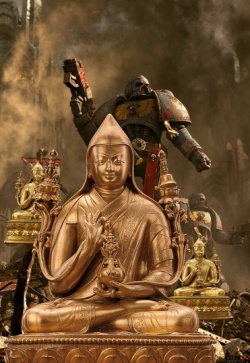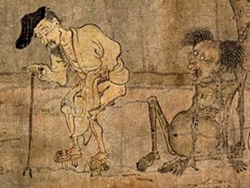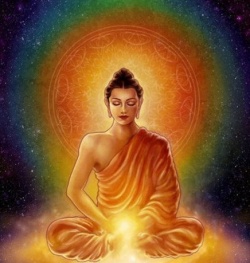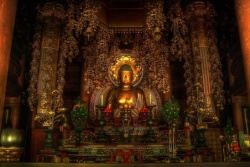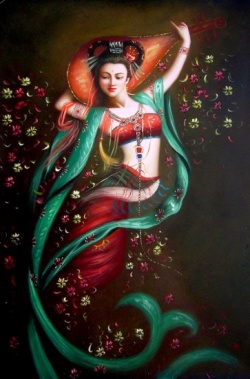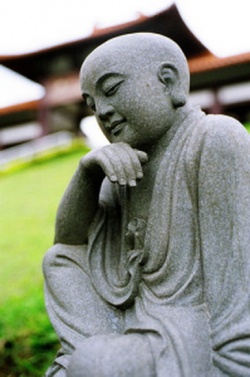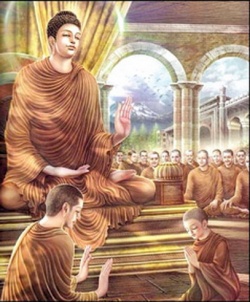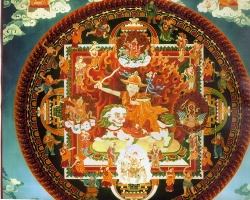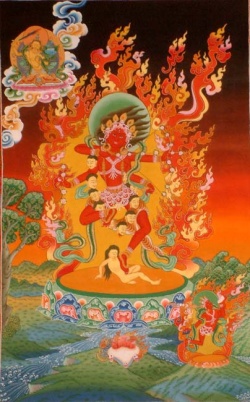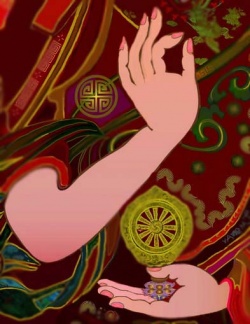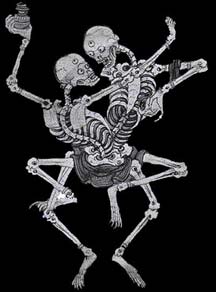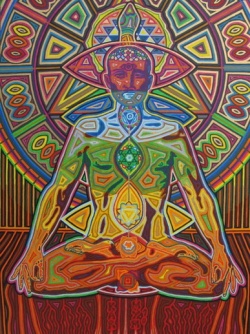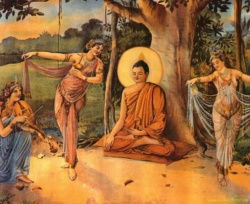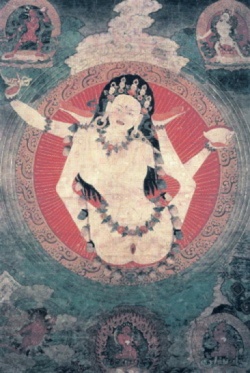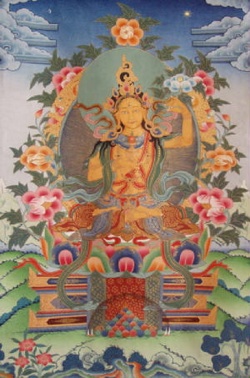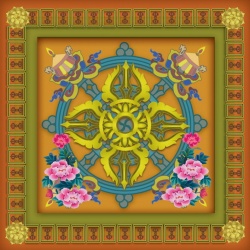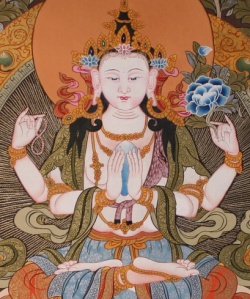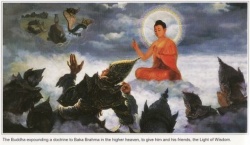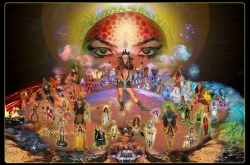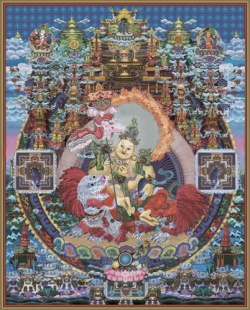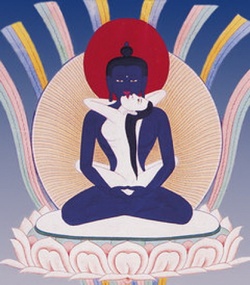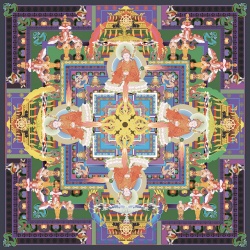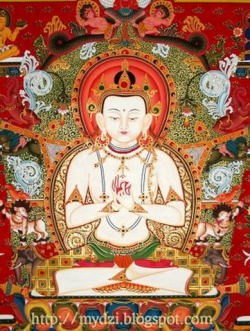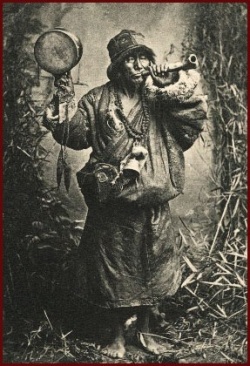The Buddha Speaks of Amitabha Buddha Sutra Part 3
Shariputra
This venerable Elder is named after his mother. Shari is his mother’s name, and putra means son . Shariputra can be translated as: 1. “Body son” : His mother’s body was extremely beautiful. Her demeanor was upright and proper. 2. “Egret son”: His mother’s eyes were as beautiful as the egret’s. 3. “Jewel son”: Her eyes shone like jewels and she bore a son with beautiful eyes.
Shariputra’s father was from the Great Brahmin class, was erudite, and had deep, profound study. He used to indiscriminately study all of the sutras. His wife dreamt of a man in golden armor, holding a Vajra pestle with which he crushed the mountains to smithereens, leaving only one standing. That auspicious omen indicated that she would give birth to a boy possessing great wisdom, unbeatable in debate, and who could prevail over the other doctrines. When she got pregnant, her wisdom increased many-fold, and she could hold her own in debates against lofty virtuous cultivators.
While in her womb, Shariputra helped his mother win debates, especially with her brother who used to consistently beat her. The uncle knew that it was due to the child in her womb. The uncle then traveled far and wide and studied for sixteen years. He took no time to bathe or to cut his nails and hence was known as “the Long-Nailed Brahmin.” He then returned to find out that his nephew had left-home under the Buddha. Thereupon, he sought out the Buddha and demanded his nephew back. The Buddha replied that he would return Shariputra if the uncle could present a true principle. “I take non-accepting as my doctrine ,” said the uncle. “Really Do you accept your view of non-accepting ” said the Buddha without any hesitation.
The uncle was at a loss. Either way he could not win. To refute it would be to admit that he had no doctrine. To accept it would contradict the doctrine of non-accepting itself. Before the debate, the uncle insisted that if he won, he could take Shariputra back with him. If he lost, he would offer his head to the Buddha. Realizing that he had lost, the uncle took to his legs and ran away. But he changed his mind and felt ashamed of his cowardice. Thereupon, he went back and asked the Buddha for a knife so that he could cut his head as agreed upon. The Buddha convinced him that it was not smart and talked him into leaving the home-life instead. The uncle did. Ven. Shariputra was a Dharma nature elder. At the age of eight, he studied and mastered all the Buddhadharma in seven days and defeated all other Indian philosophers in debates. He was well known in all directions, had lofty aspirations, and was honest in nature.
His heart was kind and compassionate. He would soon undo all attachments and unfold his wisdom. He falls under the inner wisdom category , of the first pair. Shariputra is foremost in wisdom, and is second to none in spiritual penetrations as well. Even Mahamaudgalyayana could not use his spiritual penetrations to move a corner of Shariputra’s sash while he was in samadhi.
Why was he foremost in wisdom Because on the causal ground, he met a Good Knowing Adviser who taught him the Prajna Dharma Door of reciting the Great Compassion Mantra, Shurangama Mantra, the Ten Small Mantras and The Heart Sutra. Reciting these every day will make your wisdom unfold. Shariputra actually already attained Buddhahood and is called Golden Dragon Buddha. Question: There are many Great Arhats also with great wisdom and penetrations, why list Shariputra first amongst them Answer: Only Shariputra could beat all the Sound Hearers in debate. He had superior and incomparable wisdom. He was Mount Gdhraka’s Dharma requester, and the leader of Vaisali’s Sound Hearers. If he is listed as the first, how is that unreasonable Mahamaudgalyayana Maha has three meanings: 1. Great: He is respected by many kings and officials.
2. Many: He has many blessings, virtues, retinues, etc.
3. Victorious: He can defeat and subdue the demons and externalists.
Maudgalyayana means “descendant of a family of bean
gatherers ”—referring to his mother’s side. It also means “turnip root ” because his ancestors ate turnips when they cultivated the Way. Many of them left the home-life. Maudgalyayana was also called “Kolita ” after the tree where his parents prayed to the tree spirit for a son. Maudgalyayana was a close friend of Shariputra. They both were disenchanted with the worldly dusts but had nowhere to turn. They both studied under an externalist teacher but told each other that it was not ultimate. They therefore searched everywhere for a better Dharma. Shariputra ran into the Buddha’s disciple Asvajit , and was greatly impressed by the venerable’s awesome comportment, bliss, and refined appearance. He asked the sramana, “Who is your teacher What does he teach” Asvajit answered, “My teacher is the Buddha,” and then spoke the following verse: All dharmas arise from conditions They also perish from conditions
My teacher Shakyamuni the Buddha
Often says so .”
Upon hearing it, Shariputra certified to First Stage Arhatship. He went back and told his friend Mahamaudgalyayana who also certified to First Stage Arhatship as well. They both led all their 200 disciples to take refuge with the Buddha. The Buddha said, “Welcome bhikshus .” On hearing this, they obtained the full precept substance. They gradually cultivated and certified to Fourth Stage Arhatship. Maudgalyayana was foremost in spiritual penetrations. He was exceptionally filial to his parents and rescued countless living beings who were suffering in the netherworlds.
He is classified under the outer penetration category of the first pair. There are six kinds of spiritual penetrations: 1. As- ou-Wish Spiritual Penetration : This is also called the spiritual foot spiritual penetration because one can go or fly anywhere without ob-structions, and can manifest or transform freely. According to the Great Shastra, there are three kinds of “as you wish” penetration. The first entails the ability to go anywhere , which has four possible varia-tions: a) the body can fly like a bird , b) “moving the distance but staying close” : one can travel to other locations while one’s physical body stays in the same place, c) disappearing here and appearing there , d) arriving in the span of a thought . The second “as you wish” penetration involves being able to transform and change . One can change from big to small and vice versa. One can manifest many from one and change from one to many. The final “as you wish” penetration is referred to as The Sagely As ou Wish . One can observe and see that the six dusts are not worth attaching to, one can see the impure as pure, and one can observe and see lovable and pure things, which are usually adored, as impure. Only the Buddha has this third penetration. Such spiritual penetrations are the result of cultivating the four bases of spiritual powers which will be de-scribed later.
They successively manifest with cultiva-tion over time.
2. Heavenly Eye Penetration , which is also called the Pure Eye , allows one to see far and close in the Desire and Form Realms. One can use this spiritual eye to see all the things in the six paths, both in this land and below. The Heavenly Eye comes in two types. The first is ob-tained by humans through cultivation such as by those with samadhi (the four dhyanas and samadhis). The other kind is obtained through retribution by birth to the heavens. The Heavenly Eye can give rise to the birth and death wisdom , enabling one to know how sentient beings die from one realm and are reborn into another.
3. Heavenly Ear Penetration : One can hear sounds in the Desire and Form Realms. One can hear sounds in this land, below and above, whether from humans or non-humans, close or far, etc… As in the case of the Heavenly Eye, this penetration al-so comes in two types: either that obtained through cultivation or through retribution.
4. Others’ Thoughts Penetration : One can read other people’s thoughts.
5. Knowledge of Past Lives Penetration : One can know of one’s past lives: which world, name, lifespan, living conditions (suffering or blissful), etc. one has had. One can know the birth and deaths of the five skandhas with outflow in the Desire and Form Realms. One cannot know of the Formless Realm in-carnations. One may be able to remember existences back to past great kalpas. Arhats and Pratyekabuddhas can remember back to 80,000 great kalpas ago. 6. Ending of Afflictions Penetration : With this penetration, all outflows have ended and one no longer undergoes birth and death.
The prior five penetrations can be cultivated or obtained by retribution. This one, however, must be obtained through cultivation, and on-ly sages can attain it. Here again there are two types. One belongs to the Buddhas who have ended all outflow habit energies. The other belongs to the Bodhisattvas who have not yet ended all outflow habit energies. After obtaining these spiritual penetrations, Maudgalyayana saw his mother in the hells, suffering of thirst and hunger. He flew over and brought food for her. She greedily took the bowl of food he gave her with one hand while covering it with the other. As soon as she put the food to her mouth, her karmic obstructions turned it into flaming coals that burned her lips.
Mahamuagalyayana was greatly distressed and asked the Buddha for help. He was told to use the Ullambana “releasing those who are hanging upside-down” Dharma. On the fifteenth day of the seventh lunar month, the Buddha’s delight day and the monks’ pravarana , Maudgalyayana did as the Buddha instructed and offered all varieties of food and drinks to the sangha of the ten directions. Using their combined power, his mother could then be released from her suffering. Because Maudgalyayana did as ordered, his mother was consequently reborn to the heavens thanks to this Ullambana Dharma. Mahakashyapa “Maha” distinguishes him from the other Kashyapas. Kashyapa means “great turtle clan ” because his ancestors saw the pattern on the back of a giant turtle and used it to cultivate the Way. It also means “light drinking clan ” because his body shone with a light that seems to drink up or eclipse all other lights. His body shined because seven Buddhas ago, in the time of Buddha Vipasyin , there was a poor woman who decided to repair a ruined temple.
The temple had no roof and thus all the images were left exposed to the elements. One of the Buddha images even had a gap in its face. She went everywhere asking for help. After collecting enough money, she commissioned a goldsmith to re-gild the images. The goldsmith fell in love with the woman, offered his labor for free and they got married. For 91 kalpas, they were husband and wife and their bodies shone with purple and golden light. Mahakashyapa constantly enjoyed blessings for 91 kalpas, and his wife often born amongst the god and human realms.
Eventually he was born into the Brahma Heaven. At that time in Magadha there was a Brahmin who was very rich from having cultivated blessings in prior lives. He was smart, very wise, and had mega blessings (his store house was full of silver, gold, and the seven gems; it had cattle, sheep, fields, houses, servants, chariots and carts). He was even richer than the king. The king had 1,000 gold plows. He was afraid of being accused of being as rich as the king, fearing that he might be punished by the king, so he purposely only kept 999 gold plows. He also had 1,000 gold blankets; the worst one was worth 100,000 grams of gold. He had 60 chuan of gold nuts, each having a size of 340 hu (a measurement unit used in ancient China; 24 liters = 1 hu ).
Although fabulously rich, the Brahmin had no son. There was a tree spirit living by the side of his house. He and his wife prayed to the spirit for a son. After several years, they still obtained no response. He said angrily, “After another seven days of sincere offerings, if there still is no response, I will burn up this tree.” The tree spirit got worried and scared, and reported this to the Four Heavenly Kings. The Four Heavenly Kings reported it to Shakra, who investigated and saw that no one in Jambudvipa was blessed enough to be his son. Shakra then reported to Lord Brahma who saw that Kashyapa was dying, and therefore advised him to be reborn as the rich Bramin's son.
This explains Mahakashyapa’s personal name, which is “pippala ” because his parents prayed to the spirit of the pippala tree to grant them a son. So a son was born into the Brahmin family. A physiognomist was consulted and predicted that he would leave the home-life. The parents were not pleased with the prediction. They came up with a multitude of ways to dissuade him and rid his mind of such thoughts. They decided to marry him off since the opposite sex was what keeps us in the world. At the age of fifteen, the parents announced that they were seeking a wife for him. Kashyapa refused, declared he wished to lead a life of purity (probably from his Brahma Heavens habit energy).
His parents would not give their consent. Kashyapa then came up with a ruse: he would only marry a girl whose body had a purple golden light. Undaunted, his parents contacted all their Brahmin connections to find such a girl. The Brahmins built an upright adorned gold statue and traveled the land proclaiming that the girls who saw and bowed to the gold statue spirit would marry a good husband. There was a lady whose body shone with golden color. She was upright and proper without compare. She heard the news and came over to bow to the golden statue. The Brahmin approved her at first sight and married her to his son. After getting married, Mahakashyapa and his new wife agreed that there would be no hanky panky between them. Both agreed to live in separate rooms. Their parents discovered the pact and destroyed one room forcing them to share the same room.
Then they made a new agreement: one would sleep while other cultivated. Once, while the wife was sleeping, she stretched her arm outside from the bed and a poisonous snake entered the room, wishing to strike her arm. Kashyapa caught sight of the snake. He immediately covered his arm with some cloth, gently lifted her arm and placed it back on bed. His wife suddenly awoke and scolded him for his impure behavior. “Why did you touch my arm” she asked. Kashyapa explained to her that a poisonous snake had threatened to bite her. She said, “If bitten, half of my body would be withering. But if touched by my husband, I’d fall into the three evil destinies.” Husband and wife washed and bathed thoroughly. Deeply abhorring the world, they both came to their parents’ room and begged for permission to leave the home-life. The parents could not dissuade them and finally agreed.
Both became left-home people. They sought out the Buddha who accepted them as disciples. They both cultivated vigorously and gradually obtained the fruition. The Venerable’s mind was firm and flawless like jade. His body and face were of a golden color. Most other cultivators could not compare with their practice. His practice of lessening desires and knowing contentment was unparalleled.
Even today, Ven. Mahakashyapa has yet not entered Stillness. Rather, he entered samadhi at Chicken Foot mountain in unnan. He will present Shakyamuni’s sash to Maitreya at the Dragon Flower Assembly. Then his work in the Saha world will be complete. His wife became “Purple and Golden Light” Bhikshuni. Mahakashyapa was the very First Patriarch of the Orthodox Buddhadharma lineage. When Shakyamuni Buddha spoke Dharma at Vulture Peak, the Great Brahma Heaven King presented him with a golden lotus and offered his body as a Dharma seat.
The Buddha held the flower in front of an assembly of hundreds of thousands of gods and men. Only Mahakashyapa broke into a smile. The Buddha said, “I have the Proper Dharma-Eye Treasury , the Wonderful Nirvana Mind , the Real Mark which is unmarked , the subtle and wonderful Dharma Door . I now bestow this Dharma Door to Mahakashyapa in a mind-to-mind transmission Mahakashyapa left the home-life under Shakyamuni at the age of 160. He was foremost in ascetic practices as well as in age. Ascetic practice means “making an effort , striking up one’s spirits with courage and vigor ” to sweep away defilements and afflictions. The cultivation of these ascetic practices is a sign that the Buddhadharma is being maintained. For as long as they are practiced, the Dharma will remain in the world. If they are not practiced, the Buddhadharma will disappear.
The Twelve Ascetic Practices are: 1. Wearing rag robes . In the old times, monks had to collect discarded rags from garbage bins, wash them thoroughly and then sew them together to make sashes. The sashes are symbols of not being attached to nice clothes. The advantages are to decrease greed so that one’s heart is calm and at peace, and others are not envi-ous.
2. Having only three robes to wear , along with one bowl and a sitting cloth. The three robes are the great robe, the sanghati, which consists of 25 strips of cloth di-vided into 108 patches, worn when lecturing on the sutras or visiting the king. The second is the outer robe, the ut-tarasanga, made of seven strips, worn when bowing re-pentance or worshipping the Buddha.
The third is the in- ner robe, the antarvasaka, which is worn at all times, to work, travel or entertain guests. One learns to be content with few possessions.
3. Always begging for food . One does not cook for oneself.
4. Begging in succession , sequentially going to seven houses without any discrimination. If no food is offered at those seven houses, they simply go hungry for the day. Mahakashyapa used to specialize in begging from poor people while Subhuti specialized in begging from rich people. The Buddha chastised them and told his left-home disciples not to discriminate among donors.
5. Eating one meal at noon , which reduces the time required for eating and creates more time for cultiva-tion.
6. Reducing the measure of what you eat —i.e. eat-ing a little less.
7. Not drinking juice after noon , to avoid giving rise to pleasure and attachment, distracting one from single-minded focus on practicing the good dharmas.
8. Dwelling in an aranya . Aranya means “still and quiet place.” One is left alone and there are no distracting noises.
9. Dwelling at the foot of a tree . Left-home people used to live in the open. They would stop under trees to rest and stay the night. They would then move on after two nights in order to prevent creating conditions.
10. Dwelling under the open sky . This sharpens and toughens the mind, facilitating one’s ability to enter the emptiness samadhi.
11. Dwelling in a graveyard . This is a very effective cure for laziness because being surrounded by ghosts and spirits will put us on our toes.
12. Ribs not touching the mat . One does not lie down, making one less prone to getting afflicted. Mahakashyapa cultivated all of the above twelve practices. Even when he was over two hundred years old and the Buddha told him to take it easy, he simply smiled and kept it up. Much of the information about the Buddha’s disciples comes from Great Master Xuan Hua’s explanation of the Amitabha Sutra.
Mahakatyayana The Great Hair Cutting Scissors were male descendants of the Brahmin class. In the ancient times, these immortals (‘immortal’ means having a very long life, but not living forever) cultivated in secluded mountains. They grew old and their hair and beards became long, which they did not cut because the Brahmins forbade cutting hair. One Brahmin had two sons. The two brothers came to visit their father and the younger son offered trim all the immortals’ hair. They all agreed and later accomplished the (immortal) Way. Subsequently this class was named ‘Hair Cutting Scissors’. This group was composed of the ancestors of this immortal. Katyayana means fan cord .
Katyayana’s mother loved him dearly. Soon after birth, his father died and his mother wanted to re-marry but this child was like a tie that prevented her from doing so. In the past, Katyayana used the Five Precepts to sweep the causal ground. He therefore obtained the result of being upright and proper without compare. He traveled extensively to transform and guide beings. He once met with a King who was very impressed with his upright and proper demeanor.
When the king asked the World Honored One about Katyayana’s upright appearance, the Buddha replied that, since the King already used the Five precepts to eliminate defilements, he too would obtain a similar upright and proper comportment. The King was greatly pleased and brought forth the Bodhi mind. This Venerable Sage’s debating words rushed out like heavy waves. His facial features were flawless like crystal. He could use the wisdom torch to destroy the long night’s darkness and could rapidly break or destroy his opponent’s case with sharp words. He defeated the doctrines of the six famous contemporary teachers’ and their cohorts. Katyayana means “literary elegance ”—his eloquence was unparalleled, and he was foremost in debate .
The Agama sutras told how he debated with a Brahmin externalist who did not believe in the heavens or hells, but believed only in nihilism. This externalist’s premise was that if people went to hells or heavens after death, they would have come back to tell their family and friends. Mahakatyayana explained that those who went to the heavens would never bother coming back because that would be like going back to an outhouse. As for the hell dwellers, they could not come back because they were in a prison and could no longer come and go as they pleased. The externalist was speechless and conceded. There are four kinds of unobstructed eloquence:
1. Unobstructed eloquence in Dharma: To be able to ex-plain the Dharma without obstruction.
2. Unobstructed eloquence in meaning: To be able to explain the Dharma’s limitless meanings.
3. Unobstructed eloquence in phrasing: One’s rhetoric is effective.
4. Eloquence of unobstructed delight in speech:
To take delight in explaining the Dharma by enrapturing one’s listeners. ‘Katyayana’ also means “good shoulder ” because his shoulders were beautiful. In addition, it means “victorious thinker ”, again because of his unobstructed eloquence. Of the eight pairs of virtues/distinctive competences according to which the Great Arhats are listed, Katyayana manifests eloquence. Mahakausthila He was Shariputra’s maternal uncle. His name means “big knees ” because having big knees ran in their family. His nickname was long-nailed Brahmin . He was well-versed in the Four Vedas and was also gifted in debate . He vastly penetrated externalist skills , his speech was as refined as jade, and he extensively collected the teachings .
Mahakausthila certified to Arhatship through awakening to the principle of Emptiness. He was therefore known as “Awakened to Emptiness” . Further, Mahakausthila was foremost in replies . Revata Revata means “constellation ”, he was given this name after the fourth of the twenty-eight constellations, “the house, the rabbit and the sun ,” because his parents prayed to that constellation in order to have him. His name also means “false unity .” Revata was spending the night on the road when two ghosts came by dragging a corpse. The big ghost asked Revata whether or not they should eat the corpse. Revata remained silent, not daring to say anything. Then the big ghost tore a limb off the corpse, and the small one replaced it with Revata’s body part. That was how they finished off the corpse. In the morning Revata ran down the road screaming, “Take a look, do I still have a body” People thought he was nuts.
He finally met two high masters who happened to be Arhats. Recognizing his potential, they gave him instructions, saying, “The body is basically created by a combination of causes and conditions. When the conditions and causes separate, the body is destroyed. There is nothing that is you and nothing that is not you.” Hearing this Revata was enlightened. He left the home-life and certified to the fruition. His mind was not scattered and his mouth would not utter a lie. He falls under the pair ‘Understanding Illusion’ , and is foremost in being “not upset or confused .” Suddhipanthaka Suddhipanthaka, whose name means “little roadside” (to continue being born by the road side), had an older brother named Mahapanthaka, which means “big roadside.” In India, women customarily return to their parents’ home to give birth. For both of her children, their mother was late in returning and ended up giving birth by the roadside.
Unlike his older brother who was extremely intelligent, Mahapanthaka was very stupid. This was his retribution for being stingy with the Dharma when he was a Dharma Master in a former life.
Their mother was a rich merchant’s daughter. She had an illegitimate liaison with a slave. Out of shame and fear, they both eloped under cover of the night. When she was about to give birth, the wife told her new husband that they should return home. Her husband was reluctant and procrastinated. Not being able to wait any longer, she eventually left on her own. But it was too late, she gave birth by the roadside to ‘Big Roadside’. Then she was expecting again and left for her parents’ home but was late again and gave birth to ‘Little Roadside’. So she never had a chance to bring her boys back to visit her family.
The two brothers grew up and asked about their grandparents, uncles, and aunts. One day, they traveled back to visit the grandparents. They checked into a hotel in town and sent word to the family. The grandparents sent money to the parents with the following words, “Live where you want, you should avoid the shame of facing us; your grandchildren are accepted.” The parents left without visiting the family and entrusted the two brothers to the grandparents.
Big Roadside often accompanied his grandfather to go listen to the Buddha’s discourses. Mahapanthaka asked to leave the home-life. His grandfather gladly approved. He became a novice monk and later was fully ordained. He studied and attained Arhatship. He asked his grandfather to allow his younger brother to leave the home-life. The grandfather also gladly approved. So Little Roadside became a novice. The Buddha instructed 500 Arhats to teach him a verse. They took turns, night and day, trying to teach him:
“Guard your mouth, gather your mind; with your body, don’t offend
Do not annoy a single living being
Stay away from non-beneficial bitter practices
Conduct like this can save the world .”
However, Suddhipanthaka could not commit it to memory even after 100 days. His brother scolded him and told him that he was useless and should return to lay life. He wanted to hang himself. The Buddha transformed into a tree spirit and explained the Dharma to him. He taught him “ sweep clean”, that is to sweep away all views, thoughts and afflictions, and that was how Little Roadside became enlightened in three weeks. Afterwards, he obtained limitless unobstructed eloquence. Suddhipanthaka was foremost in maintaining the principles . From this story we can learn that, in cultivation, one need not fear that one is not intelligent enough. Instead one should be fearful that one is unwilling to bring forth the mind of cultivation. Stupid people can obtain great wisdom. Reciting “sweep clean” can even result in Arhatship! How much more will be the case with reciting the Buddha’s name!
In a prior life, he also attained great success under the Buddha. The Buddha was born into a wealthy family. He was appointed Treasurer to the King, and he excelled at omens. The Buddha once saw a dead mouse, consulted the stars, and said, “Someone of lowly station can pick up this dead mouse, start a business and keep a wife.” A poor young man, who would later become Suddhipanthaka, overheard and picked up the dead mouse. He sold it to a tavern owner to feed his cat, earning one coin. The poor man then bought molasses with the coin.
He brought a water pitcher and gave a little bit of molasses and water to some flower gatherers. To express their gratitude, they gave him some flowers which he sold in the market. He returned the following day with more molasses and water. He was given flowering plants which he also sold, thus quickly earning several coins. One day it became very windy and twigs were blown all over the King’s garden.
He struck a deal with the royal gardener offering to remove them. He gave molasses to playground children in exchange for their help in picking up the branches. A potter came by, bought the branches for 20 coin pieces and gave him many vessels. The young man next supplied 500 mowers with free water from the vessels and asked them to return the favor later. He befriended a land and sea trader, who tipped him of a horse trader coming to town with 500 horses to sell. The young man went to the mowers asked each of them to give him a clump of grass and promised not sell their grass until after he sold his. The horse trader found no grass and bought grass from him for 1,000 coins.
Then the sea-trader informed him of a new ship filled with merchandise coming to port. He hired an elegant carriage by the hour, went to port in style and bought the ship on credit. 1,000 town merchants then came to port to buy merchandise. They were informed that the young great merchant already owned it. Each town merchant agreed to pay 100 coins for a share of the ship plus 100 coins to buy him out, totaling 200,000 coin pieces. He later came to see the treasurer with 1,000 coins as a gift. He recounted his story to the treasurer who married off his own daughter to him. The young man eventually succeeded his father-in-law as treasurer. Nanda The Buddha had three “nanda” disciples: Ananda, Sundarananda and Nanda.
Nanda means “wholesome bliss .” He was a cow-herder before he heard the Buddha speak of the eleven matters of tending cows, a teaching in which the Buddha uses cow tending as an analogy for cultivating the Way. Nanda subsequently decided to leave the home-life and soon attained Arhatship. On one occasion the Buddha instructed Nanda to preach to a group of 500 bhikshunis. Hearing him speak, they all attained Arhatship. In a former life, Nanda was a king and the 500 bhikshunis were his concubines.
The king was a great Dharma protector and built a grand pagoda in honor of the Buddha. The women made daily offerings at the pagoda, vowing that they would obtain liberation in the future with the king. Nanda was foremost in ceremonies . Sundarananda Sundarananada was also known as “Venerable Happy”, and was born on the ninth day of the fourth lunar month. His body had a golden color, complete with 30 hallmarks. He was also known as foremost in looks. There was a naked externalist who became tongue-tied when he attempted to debated with Shariputra. The externalist then gave rise to deep faith in the Buddhadharma and wanted to leave the home-life. When he saw Sundarananda’s handsome and adorned appearance, he exclaimed, “The small bhikshu’s wisdom is exceptional and he is also so dignified.” He thus followed suit and left the home-life.
Sundarananda was the Buddha’s little brother. He loved his wife Sundari more than anything. The Buddha passed by one day on his alms bowl round. Sundari was having lunch with her husband. As he went to make an offering to the Buddha, his wife spat on the ground and told him he had better be back before it dried. As Sundarananda made a step toward the Buddha to fill his bowl, the Buddha stepped back and low and behold, within a few steps, Sundarananda found himself in the Jeta Grove, five miles from home. The Buddha then told him to leave home.
After having his head shaved, he still nurtured plans to run away at the earliest possible opportunity. One day, he was left alone to watch the door while everyone else went out begging for food. He was supposed to sweep the floor. He swept one end to find the wind blowing it all over the room. He tried closing the window but a gust of wind would open it. This went on for a couple of hours. He gave up because he thought that they would be back any moment. He took the back road home hoping to avoid running into the Buddha. He hid behind a tree but still could not avoid running into the Buddha and ended up going back with the World Honored One. One day, the Buddha used his spiritual powers to take Sundarananda to the mountains. There he saw some monkeys and exclaimed, “My wife is prettier.” Then The Buddha took him to the heavens. He saw a palace with 500 goddesses and servants. He found that it was to be his when he died. When asked by the Buddha, he exclaimed, “Sundari is like a monkey compared to these goddesses.” He came back and cultivated vigorously while waiting to go to the heavens.
Later, when he was taken by the Buddha on a tour to the hells, he encountered two ghosts tending to an oil pot. The fire went out and the oil wasn’t even simmering. Sundarananda inquired and the lazy ghosts replied, “There is no rush. This pot is reserved for the Buddha’s brother. When his heavenly blessings run out, he’ll fall to the hells.” Upon hearing this, his hair stood on end. As a result, he stopped cultivating for heavenly blessings and soon attained to Arhatship. Ananda Ananda is the Buddha’s first cousin.
His name means “rejoicing ”, chosen because he was born on the day the Buddha became enlightened, to his father White Rice King. He left-home under the Buddha at the age of twenty. Along with Mahakashyapa, he was the Buddha’s attendant. Standing in front was Mahakashyapa. Ananda would stand right behind him. He asked the Buddha to repeat his previously spoken sermons to him again. And he could remember them all. Mahakasyapa said that the great ocean Buddhadharma had entered into Ananda’s mind. In a prior life, Ananda was a very rich elder. He offered some drink to a novice monk who was reciting sutras. He then made the vow, “When that novice monk realizes Buddhahood I vow to become his erudite disciple.” That shami was a former incarnation of Shakyamuni Buddha.
Ananda was foremost in learning and had eight inconceivable states:
1. He never accepted special invitations.
2. He never wore the Buddha’s old clothes.
3. He did not look at improper things.
4. He did not give rise to defiled thoughts, even when he saw goddesses, asura women and dragon women.
5. He knew which samadhi the Buddha entered while the other bhikshus did not.
6. He knew the benefits received by the beings who were taught by the Buddha while in samadhi.
7. He understood completely all the Dharma the Buddha spoke.
8. He never had to have a Dharma repeated. He heard it once and would remember it. In general, sramanas cannot accept special invitations. They must eat with the assembly and cannot eat alone. Rahula
Rahula was the Buddha’s son, born from his former wife asodhara . He stayed in her womb for six years. His name means “obstacle .” In a past life, Rahula plugged up a mouse hole for six days and therefore had to
undergo the retribution of staying in his mother’s womb for six years.
Before leaving the royal palace to cultivate, asodhara asked the crown prince for a child. The prince pointed his finger at her belly and she was pregnant with Rahula. When Rahula was born six years later, king Suddhodana and the whole family thought that his mother behaved improperly. They did not believe her explanations and dug a hole and decided to throw her and the child into the fire pit. asodhara stepped up to the pit holding her child and prayed, “If I am innocent, may this fire pit turn into a lotus pool.” She stepped into the pit. It turned into a pool of water with a red lotus that grew out to safely catch both mother and child. That quelled the King’s and people’s suspicion and stopped their criticism and slander.
Rahula has another name: obstructing sun . In a former life, he was a crown prince, and was one of two brothers. The older was named Sun and the younger Moon. After their father’s death, the older brother succeeded to the throne. Later he started abhorring glory and riches. He decided to abdicate the throne to his younger brother. He then left the home-life with the Buddha and purely maintained precepts. He did not commit even the slightest infraction. Later, in the dark of the night, he inadvertently used another’s water jug. Thereupon, he immediately hit the bell to convoke the sangha to repent. The sangha felt that his fault was insignificant and did not agree to his repentance. His worries grew deeper.
He ended up entering the royal palace to inform King Moon, seeking repentance for that stealing offense. King Moon did
not wish to go against his beloved brother’s wish so he ordered his assistants to confine his brother to a room. His greed was expelled and he was overjoyed. As a result of his preoccupation for his brother’s welfare, for six months the King neglected his rule. In this lifetime, Rahula had to incur the evil retribution of being confined inside his mother’s womb for six years. Rahula was foremost in secret practices .
He worked very hard. He could enter samadhi anywhere, even while he was inside an outhouse. In the Dharma Flower Sutra, the Buddha said that when he was crown prince, Rahula was an elder. Now that the World Honored One has attained the Way, that elder became his Dharma prince. Only the Buddha could know the full extent of Rahula’s secret practices. The Buddha has three kinds of disciples: 1. True sons : These are the Bodhisattvas. 2. Initiate sons : These are the Arhats with one-sided emptiness and have not attained yet the principle of the Middle Way. 3. Uninitiate sons : This refers to ordinary people. Gavampati
His name means “cow cud .”
Far in the past, he made fun of an old bhikshu who could not eat solid food because his teeth were no good, saying, “ ou eat like a cow.” The old monk happened to be a Pratyekabuddha and instructed him to repent. Though he did repent, he was nonetheless reborn 500 times as a cow. He finally met with Shakyamuni Buddha, learned to cultivate and attained Arhatship. He is foremost in heavenly and human offerings . In the past, Gavampati picked up a stalk of wheat. Many grains fell on the ground. He therefore had to undergo 500 lives as a cow to eat them.
Then, although he was in the human realm, he still made cow chewing manifestations, snorting all day like a cow chewing its cud. Fearful that others might slander him, resulting in their falling and undergoing suffering, the Buddha ordered him to go to the Trayastrimsa heaven garden to cultivate Chan. After the Buddha’s Nirvana, during the compilation of the Dharma Store, someone came to visit Gavampati, who then asked, “Is the World Honored One at peace and blissful” They informed him that the Buddha already entered Stillness. Gavampati then asked, “How about my teacher” The reply was, “Shariputra could not stand seeing the World Honored One enter Stillness.
He said that the Triple Realm is without shelter and decided to enter Stillness early too.” Ven. Gavampati heard the words, sighed three times, and transformed water which flowed from his heavenly place to earth. Inside the water stream there was a gatha:
“Gavampati head face and body
Within the wonderful assembly was foremost upright and adorned
The elephant king left and the elephant son followed
As the Great teacher entered Stillness, so I do too .”
He then transformed a fire to burn his own body and entered Stillness. That’s how loyal and devoted he was to the Buddha and his teacher. He is therefore known as flowing stream . Pindola Bharadvaja His name means “unmoving sharp roots .” To this day, he still has not entered Nirvana because he broke the rule. Arhats are not supposed to display their spiritual powers casually. Once an elder carved a bowl out of sandalwood and put it on top of a pole and proclaimed that whoever could use his spiritual powers to bring it down could have it. Pindola Bharadvaja could not resist and did. At the time, he was in the mountains. He used his Heavenly Eye to look from afar, rode over lightning fast by spiritual penetration and entered the king’s city.
He covered up the sun and the sky was totally dark. Within the city everyone was terrified. An expectant mother had a miscarriage. When this was reported to the Buddha, the Buddha severely chastised him and said, “From now on you may no longer follow me nor enter Stillness. ou have to stay for extended lengths of time in the world to allow people to increase their blessings by accepting their offerings.” He now dwells in a southern Indian mountain . He accepts invitations and goes to receive offerings by manifesting his body. He used to request the proper ceremonies and rules. Whenever Jambudvipa people make offerings to the Triple Jewel, he comes and receives them. Pindola Bharadvaja is thus foremost as a field of blessings .
Kalodayin Kalodayin was of the Brahmin class and was a teacher of the crown prince Siddhartha before Siddhartha left the home-life to cultivate and become the Buddha. His name means “black light .” His skin was black but his body glowed and his eyes shone. One night he went begging and a pregnant woman saw him; she thought he was a ghost, was frightened, had a miscarriage and died. As a result, a precept was created forbidding sramanas to take walks at night.
Kalodayin served as the Buddha’s attendant and as a Dharma protector. He was the foremost teacher who taught and transformed the greatest number of people, having crossed over countless certified sages. Mahakaphina Kaphina means “constellation .” His parents prayed to one of the 28 constellations in order to have him. He lived in the country of Kosala . The World Honored One manifested as an old bhikshu to teach him and cause him to attain the Way. The Buddha held a tin staff while walking and stayed with Kaphina in a thatch hut. When the Buddha recognized that his good roots had matured, the Buddha regained his original form. When Mahakaphina looked at the hallmarks, he immediately brought forth the mind for Bodhi. He listened to the Buddha’s subtle words and extinguished his arrogance. That is why he is part of the extinguishing arrogance pair. Kaphina is foremost in knowledge of astrology . Vakkula Vakkula is Sanskrit for “good bearing .”
Vakkula was extremely handsome. After the Nirvana of Buddha Vipasyin , a Pratyekabuddha monk had a severe headache. Although Vakkula was a pauper, he managed to give some fruit to the ailing monk. The bhikshu ate it and his sickness was cured. Due to this offering, for 91 kalpas he received wealth and bliss in the god and human realms. The Vakkula Sutra says, “I have been studying the Proper Dharma and Vinaya. For 80 years, I never had the slightest illness even for the duration of a finger snap. I never even took any medicine or medicinal fruit .” Foremost in age , Vakkula lived to be 160. From the minute cause of giving of medicine, he obtained such an absence of disease superior retribution. Therefore he falls under the giving medicine pair . Also, in a past life Vakkula was also a monk.
He made the vow not look at any woman’s face, not to accept clothes from a woman or receive food from women. His mother missed him terribly. She came to the temple for a visit. He was not happy and chased her away. His mother harbored anger and believed that her son committed one of the five rebellious offenses. She made an evil vow, “In the future when I become his mother, I will blame him for numerous faults and often give him punishments.” Now when he was born to her again, he had to undergo the five kinds of non-deaths by infanticide. However, because Vakkula kept the precept of not killing very purely in the past, not harming any creature, not even grass or trees, he obtained five kinds of death-free retributions: 1. Fire cannot kill him : at birth, instead of crying like other babies, he smiled.
Believing that he was a ghost, his mother threw him into the fire. He emerged unscathed. 2. Water cannot boil him to death : seeing that he was not harmed by fire, she really was convinced that he was a ghost. She therefore put him into a kettle and tried to boil him. But again he emerged unscathed when the kettle lid was lifted. 3. Water cannot drown him : Exasperated, his mother then threw him into the ocean, a big fish swallowed him whole. Therfore he escaped getting drowned. 4. Fish cannot swallow him to death : A fishermen caught the fish with a net. Therefore he was not killed by being swallowed by a fish.
5. Knives cannot kill him : The fishermen used a knife to cut open the fish. He emerged unscathed from its belly thereby proving that he could not be harmed by knives. Vakkula later left the home-life and eventually realized the sagely fruition. He was well known for his practice of lessening desire and knowing contentment. He did not wear heavy clothes, disliked crowds, preferred to be a loner and constantly enjoyed samadhi bliss. Even after his own Nirvana, his stupas preferred quietude. Once King Asoka offered a coin at his stupa. The coin flew up and landed on the King’s foot. So even after his Nirvana, he disliked his stupa being disturbed. Aniruddha Aniruddha means “not poor .”
Long ago, during the time of Pusya Buddha , Aniruddha was a poor farmer who offered his lunch to a Pratyekabuddha. As a result, for 91 kalpas, he was not poor and obtained pleasure as he wished. He therefore falls under the pair: offering food to the sangha . Also, in the past, he was a hunter. He wanted to steal a fine gem. However, with one look at the Buddha’s hallmarks, he brought forth the Bodhi mind, abandoned bow and arrows and vowed to no longer harm beings. Due to this goodness power, he then could leave the home-life.
Aniruddha would often doze off while the Buddha lectured. One day, the Buddha scolded him, saying: “Hey! Hey! How can you sleep Like an oyster or a clam Sleep, sleep for a thousand years,
But you’ll never hear the Buddha’s name .”
Aniruddha became vigorous and didn’t close his eyes for seven days and nights, causing him to lose his eyesight. However, the Buddha then taught him the “Vajra Illumination Bright Samadhi ”, which enabled him to clearly see the three thousand worlds as if they were in the palm of his hand. Thus Aniruddha was foremost in the Heavenly Eye. There were over sixteen Arhats in the assembly. Among other things, they acted as: 1. Influencing assembly : e.g. their presence validates the importance of the Dharma being transmitted. 2. Recipient assembly : they are there to directly receive and benefit from the teachings. 3. Adornment assembly : their presence adds pomp and fanfare.
Buddha Speaks of Amitabha Sutra
Together with all the Bodhisattvas, Mahasattvas: Manjushri, Prince of Dharma; Ajita Bodhisattva, Gandhastin Bodhisattva, Nityodukta Bodhisattva, and others such as these, all Great Bodhisattvas, and together with Shakra, Chief among Gods, and the numberless great multitudes from all the heavens. Together with all the… Not only were there Sound Hearers in the audience, there also were Bodhisattvas in attendance who needed to hear the Pure Land Dharma Door. Bohisattvas: Bodhisattvas can appear as left-home or lay people.
They have no definite appearance. They could be from other worlds and can go everywhere to help living beings. Arhats are attached to Nirvana with residues. Gods and humans are attached to existence. Only Bodhisattvas neither choose to dwell in Nirvana nor are they confused by existence and thus they represent the Middle Way. They are the second group in the Great Assembly. They embody the mind of compassion: they are there to support the Pure Land Assembly out of compassion for living beings. Bodhisattvas belong to two major tracks :
1. Self-benefit : Their consciousness and emotions have not ended yet . They take great wisdom as foremost .
2. Benefit others : They take great compassion as foremost . They look upon living beings as just the same as themselves, choosing to forgo personal leisure and comfort in order to work toward providing relief to living beings’ suffering. They take all sentient beings’ hardships and heartaches as if they were their own, without any discrimination. “Bodhi” means enlightened, namely seeking transcendental wisdom. “Sattva” means sentient, referring to the object of their quest: liberating all sentient beings without discrimination. All the Bodhisattvas have made vows that can be classified according to the four vast vows: 1. To cross over boundless living beings. 2. To sever the inexhaustible afflictions.
3. To study the countless Dharma Doors.
4. To certify to the Unsurpassed Way.
The Mahasattvas’ reputation is well known throughout the ten directions. They are at least Eighth Ground. They all possess a great mind for the Way. Here, Maha can be translated as great, and carries four meanings:
1. Vow : They made vast vows in their quest for Bodhi.
2. Practice : They possess great conduct by working to benefit themselves and others.
3. Time : They go through great lengths of time to fulfill their work.
4. Virtue : They are replete with all the virtues of the One Vehicle.
Manjushri
In Sanskrit, the name Manjushri has the meaning “wonderful and lucky .”
According to the Avatamsaka school, Manjushri symbolizes faith, practice and wisdom. Faith is foremost because it is the mother of all virtues. Because he benefits all living beings alike without regard to whether they are friends or foes, Manjushri is considered “Wonderful and lucky.” He would never cause beings to incur losses or get afflicted. Manjushri can also be translated as “wonderful virtue
.” His name is replete with the wonderful virtues: hear-ing it can eradicate the Four Grave Offenses .
Manjushri was the teacher of all seven Buddhas of the Wor-thy Eon. He has already attained Bodhi and is named Dragon Species Venerated King Buddha . Now he is in the northern direction, becoming a Buddha called Jew-eled Accumulation When he was born, ten auspicious signs manifested to indi-cate that his virtues and merit were complete and his wisdom was foremost:
1. The room was filled with bright light , representing that his Prajna wisdom can disperse all darkness.
2. The vessels were filled with sweet dew , representing the fact that he can use the sweet dew Dharma to rescue living beings. For example, when sweet dew is sprinkled on ghosts’ heads, it immediately gets rids of their offense karma and helps them obtain a good rebirth.
3. The seven jewels welled forth from the earth for his use.
4. The gods opened their treasuries . Wheel-turning sage kings have the seven treasuries: the golden wheel, white elephant, jade woman, horse, as-you-wish pearl, minister of the army and the gods who guard his treasuries. These treasuries were buried in the earth long ago and forgotten. Upon Manjushri’s birth, the guardian gods opened these treasuries again.
5. Chickens gave birth to phoenixes . These are auspicious birds. To see one brings very good luck.
6. Pigs gave birth to dragons .
7. Horses gave birth to unicorns , another auspicious animal. When Confucius was born, a unicorn appeared. His mother tied a string around its neck. Near the end of his life, some hunters killed a unicorn with a string around its neck. Confucius saw it and knew that it would not be long before he would die.
8. Cows gave birth to cais . A white cai is an extremely rare and auspicious animal. It looks like a horse but has the hooves of an ox. 9. All the grain in the granaries turned into gold . 10. Elephants with six tusks appeared . These ten symbolize the ten paramitas.
Manjushri Bodhisattva is called the Dharma Prince, because toward the Buddhadharma he has already attained self-mastery. Like the other Bodhisattvas, he “enters the proper position”: he invigorates the Buddha seeds and will eventually succeed in the Dharma King (Buddha) position, just like the crown prince succeeding to the king’s position. He is the leader of all the Bodhisattvas. He came to support the Pure Land Dharma Assembly. Because the Pure Land Dharma Door is truly inconceivable, it would take the foremost in wisdom Bodhisattva to be able to certify and understand it. Shariputra represents the Provisional wisdom while Manjushri the Actual wisdom.
It took both the foremost representatives of these two types of wisdom to provide a foundation for the Pure Land Dharma Door for transforming oneself and transforming others. Question: This Mahasattva has already perfected his vows and practices. He has his own Buddhaland where he crosses over living beings. Why would he neglect his own Buddhaland and show up in the Saha world Answer: Buddhas operate differently than we do. They do not discriminate between their own Buddhaland and other Buddhas’ Buddhalands. This Mahasattva exhibits great kindness and compassion in going to our Saha world to help Shakyamuni Buddha propagate the Pure Land Dharma Door. ou should not doubt such magnanimous and selfless acts of the enlightened beings! Ajita Ajita means “invincible .” He is none other than Maitreya “kind clan ” Bodhisattva.
He specializes in cultivating the Compassionate Mind Samadhi: no matter how badly he is treated, he still maintains a mind of compassion toward all living beings. In the past, he was of the Brahmin class called All Wisdom and cultivated kindness for eight thousand years. Also during the time of Tisya Buddha , he and Shakyamuni both came, brought forth the resolve for Bodhi and constantly cultivated the dharma of kindness. The Compassionate Flower Sutra says that he made the vow that during the time of the War Eon , he would protect all living beings. Because of his compassion and extreme kindness for the living beings of the chaotic late eons, Ajija appeared in the world.
All the Small Vehicle practitioners cannot defeat him, which is why he is named invincible. When his mother was pregnant with him, her attitude changed. She became very compassionate toward all living beings and showed great kindness towards those who were in difficulty. That prompted a physionomist to proclaim that it was all due to the child’s virtue. That was why he was thus named as being of the kind clan. At birth, he had the full 32 hallmarks, his body was of purple-golden color, and his comportment and attitude were particularly noble and extraordinary. Now that the causes have matured, he showed up at this Pure Land Assembly to demonstrate his support for the Pure Land Dharma Door.
He is the next Buddha, presiding over the Dragon Flower assembly and will cross over innumerable living beings. Right now he is in the Tushita Heaven Inner Court awaiting his time. To cultivate the Compassionate Mind Samadhi, one must first practice patience. Ajita wrote a verse: The Old Fool wrapped in ragged clothes His belly is filled with bland food He mends holes to keep him warm
Accords with the myriad conditions
If someone scolds the Old Fool
He accepts it calmly
If someone gives him a beating
He rolls over and sleeps
Spit on my face
I’ll let it dry by itself
I save my strength
You avoid getting afflicted
This kind of paramita
Is a jewel amongst the wonderful
If you know of this
Why worry about failing to accomplish the Way
To accord with conditions is: , When something manifests, reflect it; after it’s gone, return to stillness. Gandhastin/Nityodukta
/
Gandhastin means “never resting .” Since many eons ago, he has been practicing benefiting others and has not rested even for a single moment. The world has boundless worrisome dusts. Living beings create countless offenses. The love river is bottomless and its waves are endless. Realizing that, this Bodhisattva does not have the heart to even take a break from his rescue work.
This is in the spirit of the Vajra Sutra, which states, “Whether born from eggs, womb, moisture and transformation, up to and including those not with thoughts, not without thoughts, I will make them all enter the Nirvana without residues and realize Extinction.” Similarly, in the Shurangama verse, Ven. Ananda made the vow, “If a single living being has not accomplished Buddhahood, I vow not to enter Nirvana.” Nityodukta Nityodukta means being “ever vigorous ” in thought after thought, without laziness. The Chinese term for vigor consists of two characters . means not mixed, the result of the absence of falseness. means to proceed or to get closer, as a result of understanding the principles.
This particular Bodhisattva would go through countless kalpas just to save one living being; he would never have a thought of giving up on anyone. This pair of pitying sentient beings and practicing vigor urge each other on for limitless kalpas. Not resting and ever vigorous denote the same meaning. Their practice is just the same: they seek the Buddha’s wisdom from above to benefit and rescue living beings below. Wisdom and compassion are both employed. Although there are many more Bodhisattvas, only four are mentioned because they symbolize the three requisites:
1. Manjushri symbolizes faith. The Pure Land Dharma Door is truly inconceivable, only those with great wisdom can bring forth the faith.
2. Ajita represents vows. In the past, this Bodhisattva met with Great Kindness Thus Come One , and made the vow to practice great kindness and immediately obtained the Kindness Mind Samadhi . He is mindful of all living beings, wishing them to be born to the Western Bliss Pure Land and obtain limitless life and light just like Amitabha Buddha.
3. Gandhastin and Nityodukta represent practice. This pair constantly practices benefiting living beings over long time spans. Now they practice reciting the Buddha’s name, thought after thought, vigorously without rest because they have already obtained the one mind unconfused samadhi. And others such as these, all Great Bodhisattvas. There are countless other Mahasattvas practicing the ten thousand conducts who also are present to adorn the Pure Land Dharma Assembly. They represent the vast and great assembly of compassion. At the phenomenon level, their gathering denotes great causes and conditions . They are never apart from the Triple Jewel, which provides the great causes and conditions for accomplishing Buddhahood. Furthermore, to often be able to encounter the Buddha and listen to the Dharma, be instructed on the Buddha’s knowledge and wisdom and to draw near the sangha are also great causes and conditions. At the noumenon level, their presence symbolizes the Secret
Treasury . They have already obtained the Buddha’s knowledge and wisdom.
Finally the presence of these great sages reminds us not to miss the opportinity to utilize this Dharma Door that is the faster track to Anuttara-Samyak-Sambodhi. Sakra Sakra is also called Indra, referred to in the Shurangama mantra as in Tuo La e . His name means “able heavenly ruler .” In the future he will also become a Buddha called No Attachment Venerated Buddha . Indra was a woman in the time of Kashyapa Buddha . She made the resolve to build a stupa, and got 32 others to help. As a result, they all were reborn to the Trayastrimsa Heaven, where they became the inner ministers .
In the Trayastrimsa Heaven, there are eight heavens in each of the four directions surrounding the main heaven in the center. Chief among Gods, Shakra came with his own retinues of gods and goddesses. And the numberless great multitudes from all the heavens, includes the rest of the heavens in the Desire Realm such as the Suyama Heaven, Tushita heaven, etc…
Lowest in the Desire Heavens is the Four Heavenly Kings Heaven. Each is ruled by one of the so-called outer ministers of Lord Shakra: 1. Eastern Maintaining the Country Heavenly King : His palace is made of gold. 2. Southern Increasing Heavenly King : His palace is made of lapis lazuli. 3. Western Wide Eyes Heavenly King : His palace is made out of white silver.
4. Northern Erudition Heavenly King : His palace is made out of crystals.
These four Heavenly Kings command the eightfold division of ghosts and spirits and support and protect the worlds. The Form Realm no longer has male and female because they have purity and have left behind sexual desire. The Formless Realm has no more form: they forsake it in favor of emptiness. They have no form skandha. Gods and humans are listed last because: 1. They have worldly marks (with outflows). 2. They are a mixed lot, including mortals as well as sages; e.g. the eightfold division includes many Bodhisattvas. 3. They act as outside Dharma protectors.
The numberless great multitudes from all the heavens:
Innumerable gods and goddesses, asuras, humans and non-humans, ghosts, spirits, etc… came from the ten directions. This is how wide the Pure Land Dharma’s effects are: no living being is excluded. This concludes the foreword portion of the Sutra. It was spoken without request because this Dharma Door is so wonderful that even the sages themselves do not know about it. The Buddha’s wisdom is without fault. He saw that this Dharma Door is appropriate for this wide range of listeners. He spoke of it in order to give the benefits of the four kinds of complete giving , which are:
1. Mundane Complete Giving : Enabling living beings to obtain bliss and benefit. Hearing of the Western Bliss Pure Land where Amitabha Buddha right now teaches the Dharma, we feel happy.
2. Curative Complete Giving : Enabling living beings to eradicate evil. If one does as told, practicing pure conduct and continually reciting the Buddha’s name, one will be able to extinguish the evils from three karmas of body, mouth and mind.
3. Universal Complete Giving : Enabling living beings to produce goodness. Hearing that one can obtain rebirth to his land by reciting his name, we recite in earnest. The act of recitation produces incon- ceivable goodness, blessings, virtue and causes and conditions.
4. Primary Meaning Complete Giving : Enabling living beings to enter the principles. After reciting the Buddha’s name for a while, one’s recita-tion gongfu becomes deeper, eventually facilitating one to enter samadhi and awaken to the profound prin-ciples.
